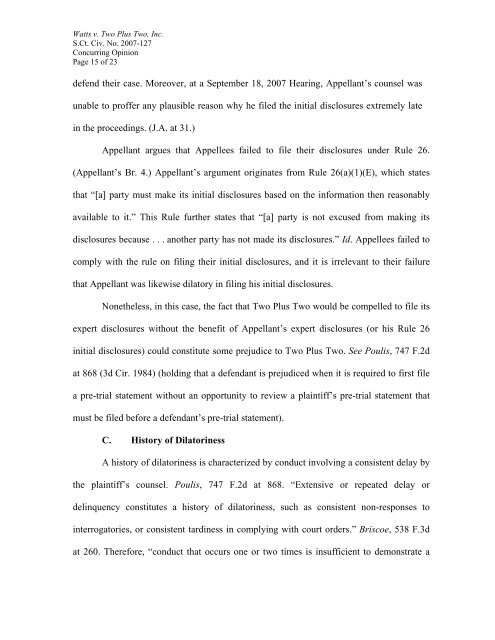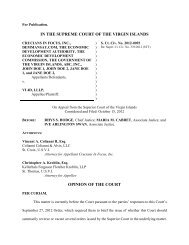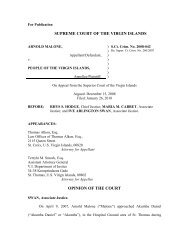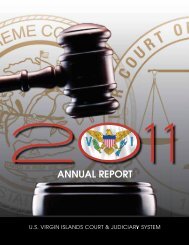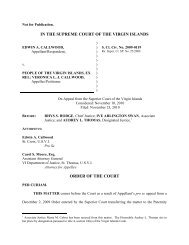IN THE SUPREME COURT OF THE VIRGIN ISLANDS OPINION OF ...
IN THE SUPREME COURT OF THE VIRGIN ISLANDS OPINION OF ...
IN THE SUPREME COURT OF THE VIRGIN ISLANDS OPINION OF ...
You also want an ePaper? Increase the reach of your titles
YUMPU automatically turns print PDFs into web optimized ePapers that Google loves.
Watts v. Two Plus Two, Inc.S.Ct. Civ. No. 2007-127Concurring OpinionPage 15 of 23defend their case. Moreover, at a September 18, 2007 Hearing, Appellant’s counsel wasunable to proffer any plausible reason why he filed the initial disclosures extremely latein the proceedings. (J.A. at 31.)Appellant argues that Appellees failed to file their disclosures under Rule 26.(Appellant’s Br. 4.) Appellant’s argument originates from Rule 26(a)(1)(E), which statesthat “[a] party must make its initial disclosures based on the information then reasonablyavailable to it.” This Rule further states that “[a] party is not excused from making itsdisclosures because . . . another party has not made its disclosures.” Id. Appellees failed tocomply with the rule on filing their initial disclosures, and it is irrelevant to their failurethat Appellant was likewise dilatory in filing his initial disclosures.Nonetheless, in this case, the fact that Two Plus Two would be compelled to file itsexpert disclosures without the benefit of Appellant’s expert disclosures (or his Rule 26initial disclosures) could constitute some prejudice to Two Plus Two. See Poulis, 747 F.2dat 868 (3d Cir. 1984) (holding that a defendant is prejudiced when it is required to first filea pre-trial statement without an opportunity to review a plaintiff’s pre-trial statement thatmust be filed before a defendant’s pre-trial statement).C. History of DilatorinessA history of dilatoriness is characterized by conduct involving a consistent delay bythe plaintiff’s counsel. Poulis, 747 F.2d at 868. “Extensive or repeated delay ordelinquency constitutes a history of dilatoriness, such as consistent non-responses tointerrogatories, or consistent tardiness in complying with court orders.” Briscoe, 538 F.3dat 260. Therefore, “conduct that occurs one or two times is insufficient to demonstrate a


